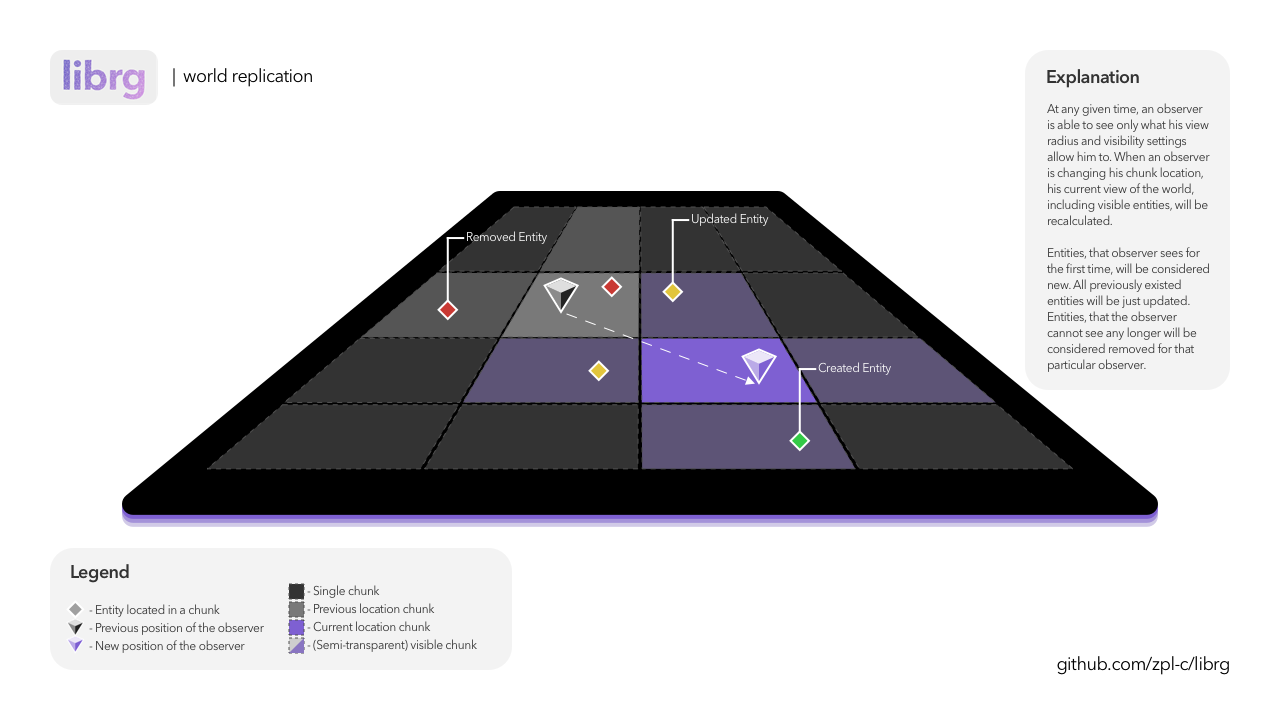zpl-c / Librg
Projects that are alternatives of or similar to Librg
Introduction
librg is a lightweight library that serves as a middleware between data-transferring libraries (networking, file-streaming, etc.) and core application/game logic.
Main responsibilities of the library include:
- entity tracking (tracks which entity belongs to what world, and what states do they have)
- owner tracking (tracks which participant owns what entity)
- area of interest management (controls what can and cannot be seen a participant)
- world replication (re-creates a limited representation in a destination world of what is considered visible to a participant in the source world)
The library was born to solve complexities of setting up and managing the flow of multi-player games and dedicated game servers. It came a long way of stripping out things that were non-essential, slowly sculpting into its current form, which you are able to see and use today.
Features
- cross-platform support
- lightweight, single-header
- supports 2d/3d worlds of various sizes
- compile- and run-time configurable
- written in C99 (portability reasons)
- no external dependencies
- built-in unit test coverage
F.A.Q.
-
Is this a networking library?
- Not really, no. It is intended to be used with netwoking in mind, but it does not have any networking capabilities on its own.
-
Can I use any networking library with it?
- Yes. All you need is an ability to read data to and from the buffer, and most libraries do support that. Theoretically it can be anything as low level as pure
UDP, and up toWebsocket/WebRTC.
- Yes. All you need is an ability to read data to and from the buffer, and most libraries do support that. Theoretically it can be anything as low level as pure
-
The repository contains a bunch of
*.hand*.cfiles, and yet you suggest it is a single-header library, how is that possible?- The library is spread into multiple files so it is easier to work with it while developing, however each time a new release is created, a "bundled" version of the header file is created and pushed directly to the releases page.
-
Does librg offer an entity system?
- No, the library does not manage nor actually create its own entities, it rather expects you to provide your own entity/object handle to attach some internal data onto it, which in context of the library is called "tracking".
-
How do I pack data, do you provide methods for that?
- No, the library does not provide any data-packing/serialization methods. It's recommended you use some existing library for that (
protobuf,flatbuffers,msgpack, etc.), or make your own implementation.
- No, the library does not provide any data-packing/serialization methods. It's recommended you use some existing library for that (
-
I see you mention chunks, does it mean my game/app should be chunk-based?
- No. Chunks are only used internally, to artificially divide the space of the world on statically sized squares/cubes so that querying would work efficiently. Even if your game does use chunks, their amount/sizes/offsets are not required to much and be the same.
Documentation
To read detailed documentation about the library, see examples and quick start guide, please visit our documentation page.
Additionally you can check code/apps folder for actual code examples.
Illustration
Here is a simple illustration that attempts to describe how the library works on a simple 2d world of 4x4 chunks. For a 3d world of bigger size everything would work in a very similar way, just in 3 dimensions.

Migration
If you've used the library before version v6.0.0, it is recommended to read the migration guide located here.
Support
We are testing the library for various platforms. This table provides some sort of description for compatibility. If you have tested it, and your result is different from the one in the table, please feel free to describe the issue in the issues.
| Platform / Result | Windows | macOS | Linux | iOS | Android | Raspberry Pi | OpenBSD | FreeBSD | Emscripten |
|---|---|---|---|---|---|---|---|---|---|
| ❔ | clang | clang | gcc, clang | gcc, clang | gcc, clang | ||||
| ✅ | msvc, mingw | gcc, clang | gcc, clang | emcc |
Legend:
- ❔ - Library was not tested on this platform/compiler yet
- ✅ - Library successfully compiles and all tests are executed properly
Development
If you wish to contribute, add new feature, optimizations, or overall improvements, here are the instructions on how to do that:
- Clone the repo, f.e.:
git clone https://github.com/zpl-c/librg.git - Run
maketo build all projects, and verify everything works - Develop a feature, add tests for it in
code/tests/ - And eventually run
make testagain to check
In case you are working from Windows, and/or are not able to use make, you can also use built-in cmake config file to generate a Visual Studio solution, to do that:
mkdir buildcd build-
cmake ../misc -G"Visual Studio 16 2019"(or any configuration you have) -
cmake --open .(opens VS with the solution) - And repeat steps from above





